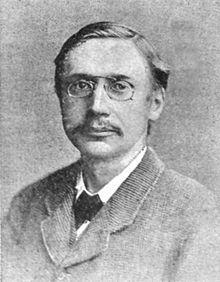| Henry William Massingham | |
|---|---|
 | |
| Born | (1860-05-25)25 May 1860 |
| Died | 27 August 1924(1924-08-27) (aged 64) |
| Occupation | Journalist |
| Political party | Labour (later) Liberal (early) |
Henry William Massingham (25 May 1860 – 27 August 1924) was an English journalist, editor of The Nation from 1907 to 1923. In his time it was considered the leading British Radical weekly.
Life
He joined London paper The Star in 1888, and was promoted to editor in 1890. In 1888 as deputy editor to T. P. O'Connor he had given George Bernard Shaw his break in journalism, appointing him deputy drama critic to Belfort Bax.
He edited the Daily Chronicle 1897–1899, but in November 1899 was forced out because his editorial line on the Second Boer War was hostile to the government.
His departure from The Nation was a matter of party politics: he had broken from the Liberals under David Lloyd George, in favour of the Labour Party. A change of ownership was putting control in the hands of John Maynard Keynes, a Liberal. In July 1914, with the threat of war and refusal of the government to deny the possibility of British involvement, Massingham and H. N. Brailsford voiced their opposition to intervention in The Nation as did other Liberals in the Manchester Guardian, The Economist, and Daily News.
Massingham during the short remainder of his life was a columnist, in the Christian Science Monitor and The Spectator.
Family
Massingham married Emma Jane Snowdon by whom he had his family. After her death he married her sister Ellen Snowdon. They were two of the daughters of Henry Snowdon of St. Leonards Priory in Norwich.
Massingham was also the father of Dr. Richard Massingham who became well known for his direction of public information films at about the time of World War II. The writer Harold J. Massingham was another son, and the playwright and actress Dorothy Massingham was his daughter.
References
- "Magazine Data Page 219". Philsp.com. Retrieved 19 November 2014.
- Richard A. Rempel (editor), The Collected Papers of Bertrand Russell (2003), p. 3.
- "Massingham, Henry William". Oxford Dictionary of National Biography (online ed.). Oxford University Press. doi:10.1093/ref:odnb/34923. (Subscription or UK public library membership required.)
- Havighurst, Alfred F. (1974). Radical Journalist: H. W. Massingham (1860-1924). Cambridge University Press. Retrieved 18 May 2019.
- Archived July 25, 2008, at the Wayback Machine
- Michael Holroyd, Bernard Shaw (1997 one-volume edition), p. 121.
- Alfred F. Havighurst, Britain in Transition: The Twentieth Century (1985), p. 9.
- Pearce, Cyril (2014). Comrades in Conscience. The story of an English community's opposition to the Great War. London: Francis Boutle Publishers. p. 49. ISBN 978-1-903427-82-8.
- "The Press: Massingham Laments". Time. 22 October 1923. Archived from the original on December 22, 2008. Retrieved 19 November 2014.
Further reading
- Why We Came to Help Belgium, online text
- H. W. M.: A selection from the writings of H. W. Massingham (1925)
- Alfred F. Havighurst (1974), Radical Journalist: H.W. Massingham, 1860-1924
External links
- Works by or about Henry William Massingham at the Internet Archive
- Spartacus page
- Newspaper clippings about Henry William Massingham in the 20th Century Press Archives of the ZBW
| Media offices | ||
|---|---|---|
| Preceded byT. P. O'Connor | Editor of The Star 1890–1891 |
Succeeded byErnest Parke |
| Preceded byAlfred Ewen Fletcher | Editor of the Daily Chronicle 1895 – 1899 |
Succeeded byW. J. Fisher |